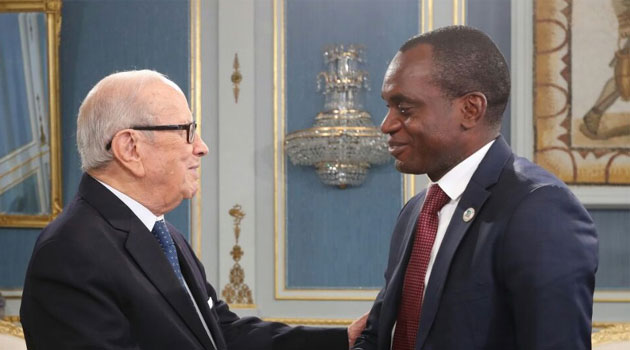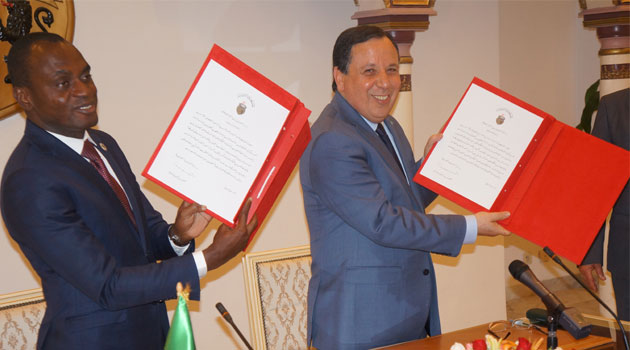
Tunisia President Beji Caid Essebsi (L) stressed the need to popularise the African Court on Human and Peoples’ Rights on the continent/CFM
ARUSHA, Tanzania, Apr 18 – Tunisia has signed a declaration to allow its citizens and NGOs in the country to file cases directly at the African Court on Human and People’s Rights (AfCHPR).
The declaration, seen as a boost to the Arusha-based court, was signed last week when the court’s President Justice Sylvain Oré led a delegation to the country’s capital, Tunis.
During the visit, Tunisia President Beji Caid Essebsi, stressed the need to popularise the African Court on Human and Peoples’ Rights on the continent to enable African citizens know about its lofty objectives and activities.
The Tunisian President commended the creation of the court, adding that its establishment guarantees protection of human rights in Africa.
“In that way, African human rights will be protected and ensure sustained democratic progress of our people,” he told the delegation, which also included judges Rafa Ben Achour and Chafika Bensaoula.
He called for extensive dissemination of information on the court to enable the population to know, understand and appreciate the court’s existence and its noble work to deepen democratic processes on the continent.
The AfCHPR president thanked the Tunisian Government for agreeing to host the court’s delegation, meet key officials and also conduct a sensitization seminar for stakeholders in Tunis.

The Tunisia declaration was signed on behalf of the government by the Minister for Foreign Affairs, Khemaies Jhinaoui/CFM
He also lauded Tunisia’s decision to sign the Article 34(6) declaration that enables Non-Governmental Organisations and individuals to access the court directly.
“I hail the government of Tunisia on this decision and urge other African countries to follow suit,” Justice Oré stated.
Tunisia becomes the eighth country to sign the declaration.
Other countries that have previously signed it are Benin, Burkina Faso, Côte d’Ivoire, Ghana, Malawi, Mali and Tanzania while Kenya, even though a member of the court, is yet to sign the declaration.
Rwanda, which had signed it, formally withdrew from the declaration last month, although the African Union Summit has urged the East African country to reconsider its position.
The Tunisia declaration was signed on behalf of the government by the Minister for Foreign Affairs, Khemaies Jhinaoui.
The AfCHPR delegation visited the Arab Republic of Egypt from 9-11 April and held discussions with various key dignitaries, including the Minister for Foreign Affairs and the Speaker of Parliament, among others.
Egypt, which has not ratified the establishment of the Court, however, expressed its appreciation of the Court’s work for the past 10 years and is giving consideration to ratifying the protocol.
“The visit to Egypt has been very much encouraging and we are looking forward to the North African country ratifying the Protocol,” said Justice Oré.
According to Justice Oré, the sensitisation visits have helped to raise awareness of the court’s existence and also to encourage more AU Member States to ratify the Protocol and make the declaration to allow individuals and NGOs direct access to the court.
“For the court to achieve its objectives and further strengthen African human-rights systems, a greater number of countries must ratify the protocol and make the declaration under Article 34(6),” he said.
Since December 2010, the court has carried out continent-wide promotion programmes which have so far seen it undertake 27 sensitisation visits and hold12 regional and continental seminars and conferences.
The main objective of the sensitization visits is to enhance the protection of human rights in Africa.
Specific objectives include: Raising public awareness about the court; encouraging the ratification of the protocol and depositing of the declaration that allows individuals and NGOs direct access to the court; sensitizing would-be applicants on how to access the court and the procedures before the court; encouraging the public to utilise the court in settling human-rights disputes; and encouraging the utilisation of the court for advisory opinions.
The African Court on Human and Peoples’ Rights was established by virtue of Article 1 of the Protocol to the African Charter on Human and Peoples’ Rights on the Establishment of an African Court on Human and Peoples’ Rights, to complement the protective mandate of the African Commission on Human and Peoples’ Rights, with a view to enhancing the protection of human rights on the continent.








































